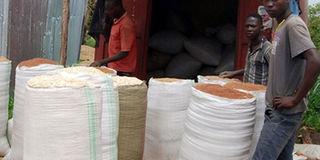Activists seek to empower youth in northern Uganda

Efforts. Youth in Amuru District at a cereal business they set up using funds from the Youth Livelihood Programme on April 4, 2016. FILE PHOTO
What you need to know:
- Training. Activists seek to train youth to be able to identify and unlock their potential in determining their own social-economic wellbeing.
Gulu. Arrangements have been finalised to equip the youth in northern Uganda with skills and make them key players in the development process in post conflict societies.
Under the initiative, Gulu Youth Conference (GUYCO), seeks to train youth to be able to identify and unlock their potential in determining their own social-economic wellbeing.
“Today, youth form the bigger percentage of our population but they suffer more, especially those in conflict-affected areas because they are not fully engaged in determining their own destiny. Our resolve now is to make them key players in all aspects of life,” Ms Louise Deininger, the founder of GUYCO, said.
Addressing the media in Kampala recently, Ms Deininger, a Vienna-based artiste, said GUYCO is now seeking for sustainable and impactful youth empowerment projects in post-conflict societies through conferences and business model trainings.
The conference
According to Ms Deininger, GUYCO has organised a conference in a move to transform the mindset of young people, unlocking their full potential for a sustainable future in Uganda.
The conference, expected to attract more than 400 youth, is slated for August 18 and August 19 in Gulu Town.
Ms Deininger said: “For this maiden conference, we are inviting renowned motivational speakers, regional and international businesses and education initiatives. We shall hold workshops for community leaders with development experts and all this is to help build a self-empowering and proactive Ugandan youth.”
Mr Robert Okello, a statistician with Barefoot Law Uganda, described GUYCO initiative as a drive to help youngsters in conflict-affected areas to realise their dream.
“This is the first initiative based on self-development. It is one of its kind where the youth in post-conflict communities are stakeholders and executing the entire process as key players in this mindset changing drive,” he said.
Mr OKello was optimistic that GUYCO would help in restructuring the understanding of youth to be responsible for themselves in addressing their challenges in society.
In a separate interview, Mr Isaac Arinaitwe, the programmes officer with Platform for Labour Action (PLA), said the nature of the job market requires young people to be able to develop their own business and employment opportunities.
“They need to be drivers of their own employment and have the entrepreneurial skills and financial knowledge to do so. Lack of capital, therefore, makes the youth fail to utilise the skills gained from the vocational training institutes to start up their own businesses and employ others,” said Arinaitwe.
Government is implementing schemes such as the Youth Livelihood Programme (YLP) designed as one of the interventions in response to the high unemployment rate and poverty among the youth in the country.
Youth policy
According to the national youth policy by the Ministry of Gender, Labour and Social Development, the lives of millions of Ugandan youth are marred by poverty, inadequate education and skills, inadequate employment opportunities, exploitation, diseases, civil unrest and gender discrimination.
“The environment they (youth) live in brings both new possibilities and new risks that undermine the traditional social support that helps the youth prepare for, negotiate and explore the opportunities and demands of their passage to adulthood. Given this situation, investment in youth is not only a social obligation but also rewarding in economic sense,” reads the policy.
The policy also provides an operational framework to all the actors with a set of realistic guidelines from which action programmes and services can be developed to facilitate meaningful involvement of youth in national development efforts and to respond to their various needs and problems.



